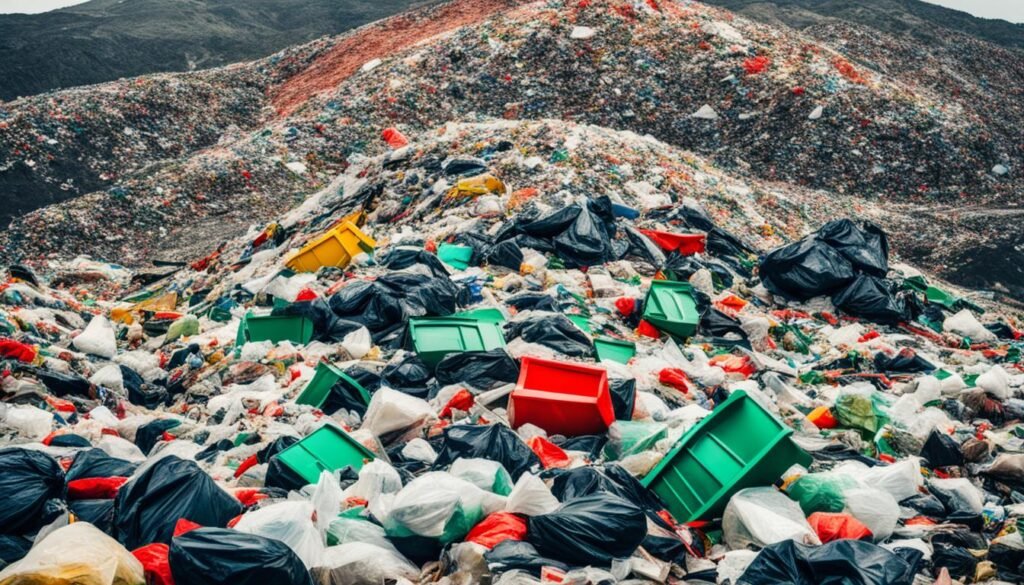In the United States, over 500 million tons of construction and demolition waste are generated every year.
Renting a dumpster is a widespread solution for managing waste among homeowners, contractors, and businesses. But understanding dumpster rental contracts can be quite challenging.
This article aims to simplify the terms and conditions of dumpster rental contracts and agreements. Knowing these terms helps secure a fair rental experience without surprises.
Key Takeaways:
- It’s vital to understand the terms and conditions of a dumpster rental agreement for a smooth rental experience.
- Know important terms like landfill/tipping fees, included tonnage, and prohibited items to avoid unexpected charges or penalties.
- Selecting a reputable dumpster rental company with clear, transparent agreements is crucial.
- Talk to the rental company about your needs to make sure the rental contract matches them.
- Always ask questions and clear any doubts before you sign a dumpster rental agreement.
Understanding Landfill/Tipping Fees
When you rent a dumpster, knowing about landfill/tipping fees is key. These fees pay for waste disposal in landfills. Good dumpster rental companies will tell you these fees upfront in their quote.
However, some companies might not be clear about these fees. This can lead to unexpected costs. To avoid surprises, always ask about landfill/tipping fees before renting. This way, you can get a full cost breakdown and make a smart choice.
Landfill/tipping fees change based on location, the type of waste, and its weight. Ask about these fees to know if they’re in the quote. A trustworthy company will be open about these fees and explain the charges clearly.
“Understanding landfill/tipping fees is vital in avoiding hidden charges and ensuring a transparent rental experience.”
– Waste Management Solutions
Knowing about landfill/tipping fees helps you understand the full cost. This knowledge prevents any unexpected charges.
Rental Fee Breakdown
Here’s what a rental fee breakdown looks like:
| Description | Charge |
|---|---|
| Base Rental Fee | $250 |
| Landfill/Tipping Fee | $75 |
| Delivery Fee | $50 |
| Pickup Fee | $50 |
| Total | $425 |
This table separates the landfill/tipping fee from other costs. It shows each charge in renting a dumpster. It helps you decide wisely by comparing different company quotes.

Included Tonnage and Overage Fees
Renting a dumpster comes with specific rules about tonnage and overage fees. There’s a set limit to how much waste you can throw away at the quoted price. It’s key to talk to the rental company about what you’ll be tossing to make sure it fits within that limit.
Going over that limit means you’ll face extra charges. These overage fees are for getting rid of waste that’s above your limit. To keep from being surprised by extra costs, guess the weight of your trash well. Then, pick a dumpster that can handle that amount.
If you’re not sure how much trash you have, it’s smarter to go with a bigger dumpster. Or, ask for a higher tonnage limit in your agreement. This way, you won’t get hit with overage fees. And your trash disposal needs will be perfectly covered.

Dumpster Types and Prohibited Items
Understanding the different types of dumpsters is key to meeting your specific needs. The main types for rentals are roll-off dumpsters and front-load dumpsters.
Roll-off dumpsters are perfect for construction sites. They are versatile and easy to use. These dumpsters fit well in large-scale projects where a lot of waste is produced.
Front-load dumpsters are best for businesses that dispose of waste regularly. They have lids and front doors for easy waste addition. Compared to roll-off dumpsters, they are smaller and picked up by trucks with automated lifting systems.
Choosing the right dumpster depends on your waste volume, space, and local regulations. Always pick one that matches your project’s requirements.
Knowing what you can’t throw in a dumpster is also crucial. Rental companies list prohibited items for safety and to follow laws.
Common prohibited items include:
- Batteries
- Motor oil
- Tires
- Hazardous materials
Throwing these items in dumpsters can harm the environment and waste facilities. Follow the rental company’s rules to avoid fines or damage.
Before you rent a dumpster, ask about what you can and cannot throw away. This knowledge helps follow the agreement and ensures a smooth waste disposal process.
| Dumpster Type | Common Use |
|---|---|
| Roll-off dumpsters | Construction sites, large-scale projects |
| Front-load dumpsters | Businesses, regular waste disposal |
Conclusion
Understanding your dumpster rental contract’s key terms is very important. This makes sure you have a safe and fair deal. Knowing about fees, the weight allowed, extra costs, types of dumpsters, and what you can’t throw away is crucial. This understanding helps you make smart choices when renting.
Always ask questions before signing a rental agreement. Clear up any unclear areas about the contract. This makes sure it meets your needs. Doing this helps you avoid unexpected fees or charges later on.
For a smooth rental process, pick a trustworthy dumpster rental company. They should offer clear contracts. Read and understand your contract well. This ensures your rental experience is safe and meets your needs when getting rid of your trash.
